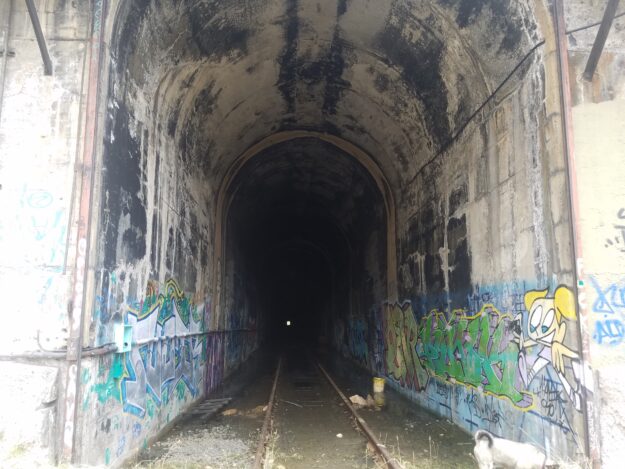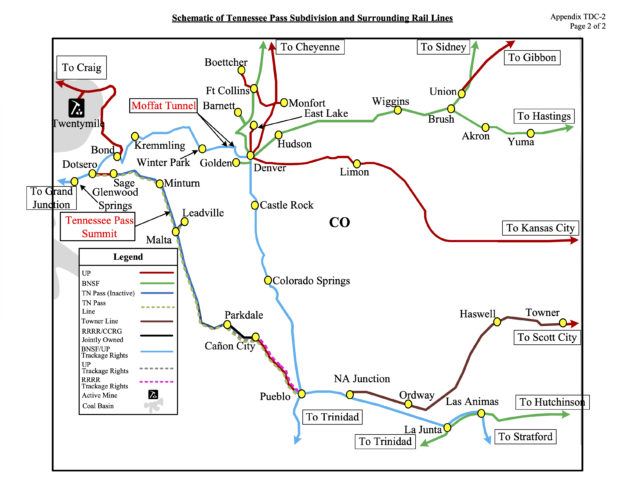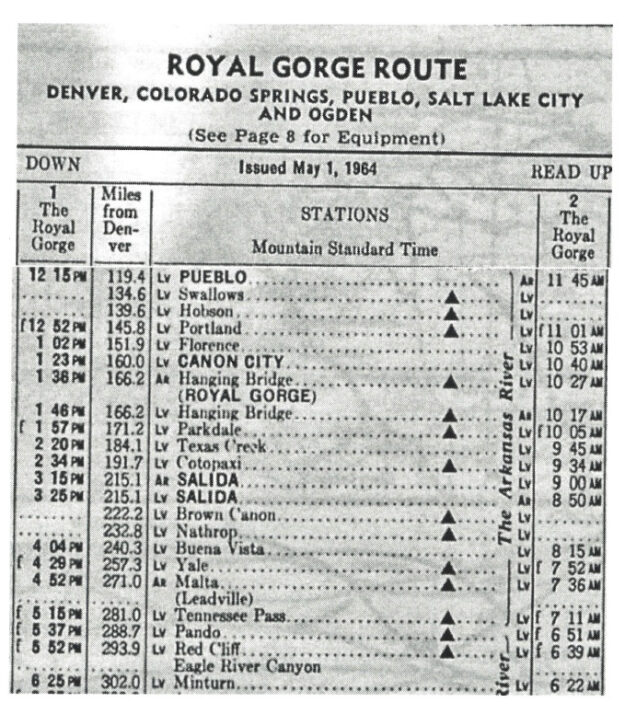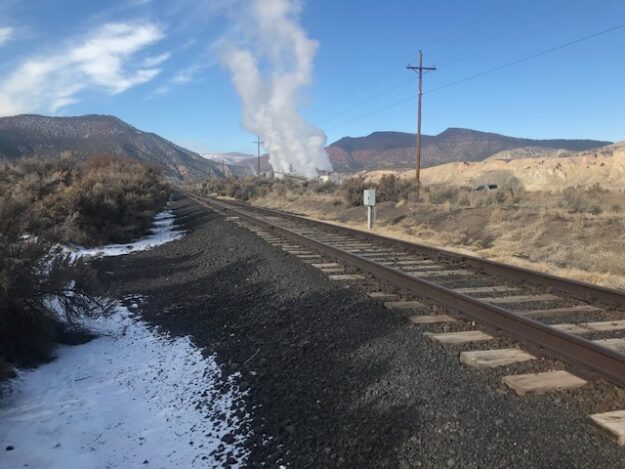Widgetized Section
Go to Admin » Appearance » Widgets » and move Gabfire Widget: Social into that MastheadOverlay zone
Two companies hope to revive passenger, freight rail service on Tennessee Pass Line

A pair of railroad companies are competing to reactivate Union Pacific’s inactive Tennessee Pass Line from Dotsero to Pueblo, using both passenger and freight service to garner community support along the approximately 208-mile stretch of track that bisects Eagle County.
In a RealVail.com exclusive that first ran in the Denver Gazette on Nov. 19, an attorney for Colorado Pacific Railroad and the company’s owner, Stefan Soloviev, outlined a plan to pump an estimated $278 million into revamping the rail line that hasn’t seen freight trains since 1997 and hasn’t had passenger service since 1964.
Soloviev, the son of recently deceased billionaire New York City developer Sheldon Solow, has built an agricultural empire in southwestern Kansas and southeastern Colorado, where he took over control of a 122-mile rail line connecting his grain and hemp fields to Front Range rail lines east of Pueblo. Now he wants to take a mountain shortcut to Dotsero, where an active Union Pacific rail line runs west through Glenwood Canyon and then on to the West Coast.

To garner the support of counties along the inactive line, Soloviev said he will offer year-round daily passenger service between Pueblo and Minturn, throwing in 60 miles of recreational trail along the train tracks from Leadville to Salida. Eagle County Commissioner Kathy Chandler-Henry told Real Vail she’s obviously more interested in commuter rail and trails between Dotsero and Minturn, especially if the line is going to see renewed freight service anyway.
Soloviev earlier this year tried unsuccessfully to get the feds to compel Union Pacific to sell him the line for $8.8 million after the rail company declined his original $10 million offer, and he’ll go that route again if UP continues to balk – this time showing the requisite “public convenience and necessity” needed to get the attention of the U.S. Surface Transportation Board.
UP officials for the first time confirmed to RealVail.com they are currently in negotiations with Texas-based Rio Grande Pacific – a relatively small, short-line operator of commuters lines that got its start buying its first line from UP in 1986. The same company had been previously mentioned in a deal to work with a Utah rail line interested in moving crude oil east along the Tennessee Pass Line to Oklahoma and Gulf Coast refineries in Texas.
UP told RealVail.com it will continue working with Rio Grande Pacific on a lease deal and will only talk to Soloviev’s Colorado Pacific Railroad if those negotiations fall through. The Nov. 19 Denver Gazette article prompted a response from Rio Grande Pacific included in a version of the story that ran in the Colorado Springs Gazette on Nov. 29 and OutThereColorado.com.
Essentially, Rio Grande Pacific argues it’s the more experienced passenger rail operator and that it’s more interested in commuter service than transporting oil, which Colorado Pacific has portrayed as its sole focus – pointing to the struggling crude oil market during the pandemic.
For Eagle County residents, train service along the line would come as a major shock to the system, at busy rail crossings near schools and for homeowners along the tracks. UP years ago tried unsuccessfully to officially abandon the line but was denied by the federal government, and for years various town and county officials sought to convert the rail line to recreational trails.
But the Tennessee Pass Line remains the only viable east-west alternative to the active Moffat Tunnel Line in Colorado, and now it seems to have serious renewed interest in being reactivated.
Here’s a full RealVail.com repost of the latest version of the story:
TENNESSEE PASS, Colo. – A railroad and agricultural company in southeastern Colorado is sweetening the pot in its bid to take over Union Pacific’s inactive Tennessee Pass Line, offering passenger trains and recreational trails to entice mountain communities along the line.
Colorado Pacific Railroad, a subsidiary of KCVN, plans to go back to the U.S. Surface Transportation Board soon to show “public convenience and necessity” on the line by offering daily passenger service from Pueblo to Minturn, an old rail town just off the back side of Vail.
The STB in March rejected without prejudice the company’s previous attempt to purchase the line from UP for $8.8 million, meaning Colorado Pacific could file again. UP late last year declined the company’s direct $10 million offer for the line that hasn’t seen freight trains since 1997 and passenger trains since 1964, saying it was in negotiations with another rail operator.
The Tennessee Pass Line runs along the Arkansas River from Pueblo through Leadville over Tennessee Pass at Ski Cooper and down the Eagle River to Dotsero in western Eagle County, where it connects with UP’s active line from Denver that travels through the Moffat Tunnel and follows the Colorado River through Glenwood Canyon and on to Grand Junction.

KCVN, which owns massive agricultural holdings in southeastern Colorado and southwestern Kansas, wants to use its 122-mile Towner Line — obtained from V&S in a federally directed sale in 2017 – to ship grain at lower prices directly to the West Coast. That line ends east of Pueblo at NA Junction, so the Tennessee Pass Line would offer a direct mountain shortcut to the west.
“In addition to restoring freight service over the Tennessee Pass Line, [Colorado Pacific] proposes to meet the statutory test for public convenience and necessity in part by restoration of daily year-round passenger service over the portion of the line between Pueblo and Minturn,” William Osborn, an attorney for the railroad, wrote county commissioners along the line.
KCVN and Colorado Pacific owner Stefan Soloviev said in a phone interview this bid to take over the Tennessee Pass Line is “extraordinarily viable. In fact, I think we will win the next decision in court because we are proving everything that we proved against V&S Railway.”
Unlike the Towner Line takeover, Soloviev knows this will be a much tougher battle, but he says federal law is on his side because railroad owners have to offer both service and competitive rates on their tracks – neither of which UP has done on the Tennessee Pass Line for 23 years.
“This happens to be Union Pacific. Obviously, it’s going be a lot harder,” Soloviev said. “We’re the underdog and it’s David going against the Goliath and you’ve got to root for David here.”
In this case, David can be a lot more flexible with local passenger service and easements within the railroad right-of-way for recreational trails than a class 1 freight railroad like Union Pacific, Colorado Pacific contends. Soloviev’s Crossroads Agriculture is one of the largest private landowners in the nation and will pump an estimated $278 million into the Tennessee Pass Line.
Asked if he’s serious about offering trail easements and passenger service to leery mountain communities, Soloviev said, “I’m sure that it’ll work beautifully on that line, because that line is beautiful. But, obviously, I’m a grain producer and now a grain buyer, so we want to get as much grain as possible flowing out of our Towner Line, onto [Tennessee Pass] and onto Dotsero.”
Grain trains would be seasonal, with wheat in eastern Colorado harvested in the summer and milo in the fall, so westbound grain trains would likely average one a day in those seasons. However, in a recent letter to the Colorado Department of Transportation, Colorado Pacific also said it would try to work with Pueblo-area manufacturers such as Vestas and Martin Marietta.
“We can show that we can bring these freight rates down by competing with UP’s flow to the west. That’s number one; that’s paramount,” Soloviev said. “There’s a law in this country that if you own a railroad and you do not operate service at a fair rate, you are subject to lose the railroad and we used that case and it worked. Union Pacific has a grain monopoly.”
Colorado Pacific alleges Union Pacific actually wants to maintain control of the line primarily by moving waxy crude oil from Utah’s Uinta Basin on a proposed rail network that would connect to UP’s Tennessee Pass Line using regional carrier Rio Grande Pacific – a short-line operator that insists its mainly interested in passenger service on the revamped line.
“Rio Grande Pacific cannot comment on negotiations currently in progress,” an official for the Texas-based company said. “Our primary interest in the Tennessee Pass Line is the potential we see for transit and regional commuter services to benefit the communities of the Arkansas and Eagle River valleys. We look forward to working productively with public agencies, counties and communities along the Tennessee Pass Line, and the State of Colorado, should we reach an agreement with Union Pacific.”
UP spokeswoman Raquel Espinoza commented in an email: “Union Pacific continues to negotiate with Rio Grande Pacific on a deal that returns service to the (Tennessee Pass) line. We are committed to seeing these negotiations through before considering any other options. If negotiations aren’t successful, we will reach out to Colorado Pacific.”
Chaffee County Commissioner Keith Baker, whose portfolio for the county includes rail issues, says a true commuter and tourist train along the Arkansas River, with people being able to get on and off with kayaks and mountain bikes from Salida to Buena Vista, is intriguing – especially if freight trains are going to start rumbling through regardless.

“I advocated that our position as a county is we would oppose it unless there’s a provision for passenger service and that passenger service has to have local capacity,” Baker said. “If it’s just passenger trains blasting through here, then it’s no benefit to us.”
And given a choice between the types of freight, which local officials may not have given the primacy of federal rail laws, Baker knows which way he would lean.
“Locally, to me, it’s an easier sell to benefit our Eastern Plains farmers and ag producers than it is oil producers in Northeastern Utah,” Baker said. “That’s why ag products are one thing, but the oil would be a whole other kettle of fish.”
Eagle County Commissioner Kathy Chandler-Henry says the county is open to the idea of passenger service from the Eagle County Regional Airport and the “down-valley” communities of Dotsero, Gypsum and Eagle, where many of the workers live, east to the ski areas of Vail and Beaver Creek, especially if freight is going to start rolling again anyway.

“If there’s going to be cargo trains and no passengers, then all we have is the impacts of noise and train crossings to deal with again,” Chandler-Henry said. “But if we also have people moving on those lines, I think this could be a great benefit to us.”
Interstate 70 over Vail Pass and through Eagle County is often closed by inclement weather, and the lack of parking in Avon (at the base of Beaver Creek) and Vail is a perennial problem. The train tracks are just a few hundred feet from a gondola in Avon that connects to Beaver Creek, and Minturn is home to railyards near a backcountry ski route at Vail called the Minturn Mile.
“It would be a real shame to end [passenger service from Pueblo] at Minturn, and I’m sure logistically that makes some sense for the railroads, with the turntables right there,” Chandler-Henry said. “But I would love to get it to go all the way to Dotsero because then that makes it into a real worker, commuter option as well.”
Chandler-Henry also noted that the county’s ECO Trails network of recreation trails has been struggling for years to connect from Vail Pass on the east all the way to Glenwood Canyon on the west. Easements within the railroad right-of-way could make that happen much sooner.
“In an effort to mitigate local concerns surrounding reactivation of the line, [Colorado Pacific] has proposed to the Parks & Wildlife Department the donation of an easement within the railroad right-of-way for a recreational trail 60 miles long between Salida and Leadville if … efforts to acquire the railroad should be successful,” Osborn wrote. The company would also be open to similar discussions in the Eagle River Valley.
As for passenger rail from Pueblo ending at Minturn, logistics are a big driver.
“Minturn seems to be the logical western terminus due to its location at the base of the Vail ski resort and because there is a railroad yard there where extra locomotives and cars can be kept, and the train could be cleaned, serviced, recrewed and restocked before the turnaround for return to Pueblo on the same day,” Osborn wrote. “Trains originating at Pueblo would likely stop at Canon City, Salida, Buena Vista and Malta (Leadville) before reaching Minturn.”
Chandler-Henry notes that could be a good low-carbon way of getting workers from the high-altitude bedroom community of Leadville to Eagle County, reducing the number of cars and trucks traveling U.S. Highway 24 over Battle Mountain Pass and through Minturn to I-70, but she said a passenger train from Dotsero to Minturn would make even more sense.
Colorado Pacific, however, says that could require another trainset and more workers.
While Colorado Pacific is still hoping for a voluntary deal with UP without returning to the STB, the company points out UP’s negotiations with Rio Grande Pacific have been going on for a year with no results and the price of crude oil continues to languish.
If Colorado Pacific goes back to the STB seeking a federal ruling to compel a sale, it will only be for the nearly 160 miles of inactive Tennessee Pass Line track from Parkdale, 14 miles northwest of the Royal Gorge, to Sage, which is just over nine miles east of Dotsero and directly north of the Eagle County Regional Airport in Gypsum.
That Dotsero-to-Sage section of UP track is still active in order to service the American Gypsum wallboard plant, but Colorado Pacific would also be seeking access at either end through UP or BSNF Railway, both of which have trackage rights at either end of the Tennessee Pass Line. Colorado Pacific’s previous filing with the STB was for the entire 208-mile line.

Colorado Pacific is also now trying to work with the Royal Gorge Route Railroad, a scenic tourist trail through the spectacular Arkansas River canyon, and Rock & Rail, a freight carrier that has rights to operate over Royal Gorge tracks and then all the way to Pueblo.
“Earlier this fall, [Colorado Pacific] inquired of the Royal Gorge Route railroad if it would be willing on a contract basis to extend its passenger operations to Minturn, on a daily year-round basis,” Osborn wrote. “[Colorado Pacific] is mindful of the importance of the Royal Gorge tourist train business to the local economy and would seek to avoid interference therewith.”
Royal Gorge Route Railroad owner Mark Greska says he has received the latest proposal from Colorado Pacific but has not had time to respond while running a tourist train during a pandemic. Greska previously told the Colorado Sun, “… they have to come to us for permission to run through the gorge and we are not going to give it to them.”
In a recent email, Greska expressed his doubts about reviving the old Denver & Rio Grande Western passenger rail line over Tennessee Pass to Minturn.
“When our family decided to bid on this 12-mile section of line, we did have the opportunity to include the entire line to Minturn,” Greska wrote. “We decided against it as, financially, it didn’t make sense. Currently, the track is a mess, most likely costing millions to repair, plus parking issues for guests, facilities to be built, etc. As for the tourist train aspect, we’ve proven that a two-hour train ride is enough for our guests, and when you offer dining options, it works well.”
Colorado Pacific’s Osborn included a 1964 Denver & Rio Grande Western timetable in his letter to the county commissioners, saying of the new proposal, which would run on upgraded tracks with new “Positive Train Control” technology, that “equipment would include a well-provisioned dining car and bar/lounge car.”
Connecting passenger service on through to Dotsero could then allow people to continue west to Glenwood Springs and beyond or east through scenic Gore Canyon on the Colorado River over the Continental Divide at the Moffat Tunnel and down to Denver, where the Colorado Department of Transportation is pushing hard for passenger service from Fort Collins to Pueblo.

David O. Williams
Latest posts by David O. Williams (see all)
- Crypto community comes together in Colorado as winds of regulatory change shift under Trump - February 28, 2025
- Bennet braces for battle over public lands, oil and gas drilling, mining, DOGE cuts of workers - February 23, 2025
- The O. Zone: Snow slams Vail, Shiffrin misses mark at Worlds, airline update - February 15, 2025



Jay G
December 1, 2020 at 7:46 pm
It was previously claimed by Attorney William Osborn that KCVN needed the Tennessee Pass line to avoid going east 250 miles- and then 250 miles back west- to connect west. That raised some doubts .
https://trn.trains.com/news/news-wire/2020/02/18-real-estate-moguls-seek-to-pry-tennessee-pass-line-away-from-union-pacific
Now they’re building a siding at NA junction to connect to BNSF with 110 car unit trains. Why didn’t they use the original connection?
https://kiowacountyindependent.com/news/1924-connection-of-the-towner-line-at-na-junction-to-bnsf-scheduled-to-begin-in-september
“We’re in the process of putting a $3.4 million unit train siding in N.A. junction. We’re going to send unit trains and only unit trains…”
Why would KCVN want to bear the rebuilding and operating cost of going over a 10,400′ pass with 3% grades that have previously resulted in accidents? Operating 110 car unit trains over these grades descending to Minturn will be as dangerous and expensive as it was for Southern Pacific.
https://www.nytimes.com/1996/02/22/us/a-derailment-in-colorado-kills-two.html
At the other end they would have to transfer to UP or BNSF to reach the final destination. UP and BNSF lines are already under utilized.
A 110 car unit train is over a mile long. It will be a long passage at grade crossings.
If you look at the Right of Way in most places between Salida and Leadville, there is no room for a trail alongside the tracks. Would KCVN buy additional land to build the trail? A second issue is safety, with an operating train on shared R.O.W., no railroad would want the liability- nor would the counties likely accept it.
Operating a marginal to losing passenger service would only add to KCVN / Colorado Pacific costs. Is KCVN looking for a subsidy from counties?
From the Trains.com article: “Colorado Pacific would spend $278 million to bring the Tennessee Pass route back to Federal Railroad Administration Class 2 track standards that would permit 25 mph operation.”
At 25 MPH the 180 mile trip from Pueblo to Minturn would take 7.3 hours, just traveling time. A passenger train may be allowed to go slightly faster, though hills and curves will require slowing. The proposed 5 stops would add significantly to this time.
The combined costs and problems are questionable.
Is the trail and passenger proposal just bait for a real estate deal ? Given the statement by Lawyer Osborn previously about the claimed need to go east before going west, the present claims are suspicious.
With oil prices low and the Uinta Basin shale oil considered marginal, the shipping of heavy waxy crude by rail over the Tennessee Pass as a shortcut is very questionable. It must be shipped in tank cars due do difficulty in putting it through pipelines. The Uinta Basin line could already connect to main lines in Western Colorado without Tenn. Pass.
Not all are fans of the Uinta Basin RR:
https://www.sltrib.com/news/environment/2020/11/03/proposed-oil-railway/
A lot of questions need to be answered.